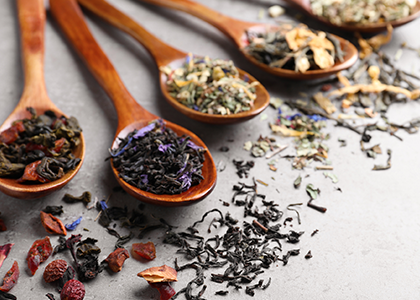
11 Teas With Amazing Health Benefits
By Isabel Smith, MS, RD, CDN
Tea is good any time!
Whether it’s the start of winter or the beginning of summer, tea can be a nice addition to your daily ritual by providing a soothing warm (or cold!) drink and rich anti-cancer and heart-healthy benefits. There are tons of teas out there, so I’ve narrowed it down to 11 that are the most popular and why they are good to drink.
1. Black Tea
Made from fermented tea leaves, black tea contains both caffeine and tons of phytonutrients. Black tea contains nutrients called theaflavins and thearubigins, types of polyphenols that contain both antioxidants that may help to repair or prevent cellular damage and may also help to promote heart health by preventing damage to blood vessels thereby helping to also prevent stroke. Nutrients in black tea has been found to be potentially beneficial when it comes to protecting lungs from exposure to cigarette smoke and to promoting heart health.
2.Green Tea (caffeine-containing and caffeine-free)
Green tea is made from steamed tea leaves and is high in catechins – a compound that may be more beneficial in preventing oxidative stress than certain antioxidant-containing vitamins like vitamins C and E. Catechins found in green tea may also be help prevent various types of cancer including skin, breast, lung, colon, esophageal and bladder. Nutrients in green tea may also promote heart health and may even play a role in preventing neurlogical disorders like alzheimers and parkinsons diseases.
3. Mint Tea (caffeine-free)
Mint tea (either in the bag or made by soaking mint leaves in hot water) may enhance digestion and soothes upset stomach as well as prevent constipation.
4. Ginger Tea (caffeine-free)
Ginger contains both anti-inflammatory, immune-boosting and digestive properties; therefore ginger tea may provide immune system support and may also soothe upset stomach-particularly when it comes to nausea. Ginger tea also contains anti-inflammatory compounds that block prostaglandins that can cause swelling in the brain and therefore may help to soothe headaches.
5. Passionflower Tea (caffeine-free)
Contains anti-anxiety compound, chrysin; passionflower tea may be most beneficial if consumed before bedtime to help ease and quiet the mind.
6. Oolong Tea
A black tea who’s leaves are also fermented but for a shorter period of time, may boost metabolism and shares similar health benefits to black and green teas when it comes to containing antioxidants and heart-healthy benefits due to it’s catechin content. Some research suggests that oolong may raise metabolic rate for up to 2 hours post-consumption.
7. Yerba Mate (caffeine-containing)
Yerba Mate contains a compound called mateine that may also slightly boost metabolic rate for some; yerba mate is also a rich source of antioxidants. It’s a popular item at many juice bars these days too!
8. White tea (contains less caffeine but isn’t caffeine free)
White tea, like green tea, contains a powerful antioxidant compound called EGCG that may also play a role in boosting hormone CCK that promotes feeling of satiety. White tea also contains powerful polyphenol compounds that are also rich in antioxidants. Compounds in white tea may be beneficial in preventing various types of cancers including colon cancer.
9.Nettle Tea (caffeine-free)
Nettle tea contains antihistamine compounds that may prevent hay fever and other allergy-driven issues; nettle tea may also help to ease allergy symptoms such as stuffy nose.
10. Chamomile Tea (caffeine free)
Some research suggests that chamomile tea may help to promote sleep and relaxation. It’s also believed to be good for the skin due to its healing, antioxidant, cleansing and moisturizing properties.
11. Matcha Tea
Matcha is a type of nutrient-packed, powdered green tea that is mixed using a whisk with hot water to make a tea. The benefit of matcha is that the whole leaf is consumed instead of the water steeped in the leaf which has research is suggesting that there is more nutritional benefit that other teas. Matcha tea contains loads of nutrients and antioxidants including vitamins A, B-complex, C, E and K as well as trace minerals and a family of phytonurients called catechin polyphenols. Learn everything you need to know about matcha tea.
So what’s the best to drink?
As you can see, all of these teas have healthy benefits. In most cases, black and green tea varieties are touted for their greatest source of antioxidants and phytonutrients. This is because black and green teas are rich sources of flavonoids, a compound of nutrients also rich in antioxidants. Flavonoids have been touted for their benefit to preventing and repairing oxidative damage in the body; they may also help to prevent clotting, which may benefit heart health and prevent stroke as well.
Research suggests that people who drink 1.5 cups of black or green tea, not herbal, may be 50% less likely to have a heart attack than those who do not. Other research suggests that people who drink black, green and oolong teas are 45-65% less likely to have hypertension than those who do not.